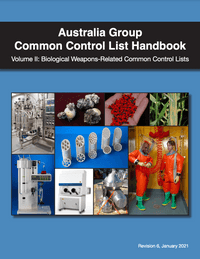Australia Group Common Control Lists
[Common Control Lists]
The Australia Group Common Control Lists exist to minimize the risk of assisting chemical or biological weapons proliferation. The lists include controlled substances (i.e. viruses, bacteria, toxins, and fungi) and controlled equipment (i.e. fermentors, clean room filters, and certain software).
SUMMARY
The Australia Group produces Common Control Lists that include any export controlled materials and equipment that could be potential precursors to bioweapons. Controlled materials related to bioweapons are divided into three lists: human and animal pathogens and toxins, plant pathogens, and dual-use biological equipment and related technology and software. The first two lists include: viruses, bacteria, fungi, toxins, and genetic elements of any of the materials. The third list includes dual-use biological equipment such as fermenters, containment equipment, and software used by biologists. Two separate lists address materials related to chemical weapons.
The Common Control Lists are available on the Australia Group website. The Australia Group Common Control List Handbook is produced separately by the United States Government and is also available on the Australia Group website.
The Australia Group is an informal, voluntary network of countries that aims to reduce the proliferation of biological and chemical weapons. In addition to providing control lists, the group also provides guidelines for responsible transfer of these materials and appropriate trade controls. Members of the Australia Group implement the export control lists and guidelines in their national legislation.
The Australia Group was originally founded in 1985 in response to chemical weapons use in the Iran-Iraq war, and was expanded to cover biological weapons in the early 1990s. The Group originally had 15 participating countries, and currently has 42 member countries (43 members including the European Commission). The Group was designed to support the activities of the Chemical Weapons Convention (CWC) and the Biological Weapons Convention (BWC). The Group has annual meetings to keep the lists up to date. The lists are available in English, French, Spanish, Chinese, Arabic, Russian, and Dutch.


..png)
